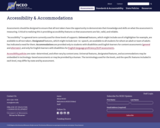
Accessibility & Accommodations
Assessments should be designed to ensure that all test takers have the opportunity to demonstrate their knowledge and skills on what the assessment is measuring. Critical to realizing this is providing accessibility features so that assessments are fair, valid, and reliable.
“Accessibility” is a general term currently used for three levels of supports. Universal features, which might include use of a highlighter for example, are available to all test takers. Designated features, which might include text-to-speech, are available to all students for whom an adult or team of adults has indicated a need for them. Accommodations are provided only to students with disabilities and English learners for content assessments (general and alternate), and only for English learners with disabilities for English language proficiency (ELP) assessments.
Accessibility policies are state-determined, and often vary by content area. Universal features, designated features, and accommodations may be embedded in technology-based assessments or may be provided by a human. The terminology used for the levels, and the specific features included in each level, may differ by state and by assessment.
- Subject:
- Education
- Special Education
- Material Type:
- Primary Source
- Author:
- National Center on Educational Outcomes
- Date Added:
- 11/23/2022